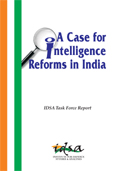You are here
-

- Publisher: Institute for Defence Studies and Analyses (IDSA)
2012
Task Force report is an important contribution to religion and International Relations (IR). Two factors make Tibet important for India in today’s context: (a) the religious and cultural factors; (b) ecological factors. Report supports this with evidence. It argues that Tibet with Tibetan Buddhists provides better security than a Hanised Tibet. Key message is Tibetan refugees do not pose a security threat to India, however more transparent data base and cooperation with exiles on common religious issues is desired.
- ISBN 81-86019-99-5,
- Price: ₹. 375/-
- Publisher: Institute for Defence Studies and Analyses (IDSA)
-

- Publisher: Gyan Publishing House
2012
This book brings out perspectives from India and Bangladesh on various important issues of bilateral cooperation. Bringing together scholars from two premier think tanks in India and Bangladesh who play an important role in providing policy inputs, generating informed debates and discussion and act as an interface between policy makers and the people, this is the first effort of its kind.
- ISBN 978-81-212-1166-6,
- Price: ₹. 650/-
- Publisher: Gyan Publishing House
-

- Publisher: Institute for Defence Studies and Analyses
2012
The Report on Intelligence Reforms in India, advocates a paradigm shift towards holistic modernisation of the current Indian intelligence setup, by bringing in radical changes in the existing intelligence culture.
- ISBN 978-93-82169-03-1,
- Price: ₹. 250/-
- Publisher: Institute for Defence Studies and Analyses
-

- Publisher: Institute for Defence Studies and Analyses
2012
The Year Book seeks to promote a better understanding of contemporary issues affecting China and their impact on India. This first edition of an annual series of year books is a compilation of incisive chapters focussing on China’s relations with the US, South Asia, ASEAN, Japan and East Asia, Central and West Asia, and the SCO. India-China relations—of considerable interest and significance to India—are discussed as are the Chinese economy, media, the People’s Liberation Army, and the political landscape inside the country.
- ISBN 978-93-82169-04-8,
- Price: ₹. 299/-
- Publisher: Institute for Defence Studies and Analyses
-

- Publisher: Norwegian Institute for Defence Studies
2012
International Order at Sea is a workshop series chaired by the Norwegian Institute for Defence Studies (IFS) in partnership with the Institute for Defence Studies and Analyses (IDSA), New Delhi; China Foundation for International and Strategic Studies (CFISS) and China Institute for Marine Affairs (CIMA), Beijing; and the Center for Naval Analyses (CNA), Alexandria, VA.
The workshop series examines seapower and the future of the global commons. It explores how international order at sea is established, maintained, changed and challenged, and it focuses on the interaction and cooperation among leading, emerging and smaller naval powers to maintain order at sea
- ISBN 978-82-91571-15-7,
- Publisher: Norwegian Institute for Defence Studies
-

- Publisher: Institute for Defence Studies and Analyses
2012
This report argues that Government and the private sector give cyber security some priority in their security and risk management plans, and do this jointly. Being a report that is addressed to the security community in the widest sense and intended to stimulate public discussion, it relies on publicly available information.
- ISBN 81-86019-98-7,
- Price: ₹. 125/-
- Publisher: Institute for Defence Studies and Analyses
-

- Publisher: Pentagon Security International
2012
This book portrays how the peculiarities of subconventional warfare impact the soldiers and what needs to be done to address the ill effects by various agencies at macro as well as micro level. Specifically, it brings out the methodology to sustain motivation of troops in this special warfare and suggests measures to optimize their stress levels. Through this book, the author has brought out various issues which cause extraordinary stress among army personnel operating in sub-conventional warfare environment.
- ISBN 9788182746039,
- Price: ₹. 695/-
- Publisher: Pentagon Security International
-

- Publisher: Shipra Publications
2012
The volume contains contributions by leading Asian analysts and Asia watchers on the theme of prospects for Asian integration. It discusses regionalism at the continental level and investigates overarching trends. It focuses on Asia's 'rise' and the key factors shaping the Asian regional order. The volume also provides valuable perspectives on Asia's sub-regions. Another salient feature of this volume is its coverage of increasingly significant non-traditional issues in the Asian context.
- ISBN 978-81-7541-615-4 ,
- Price: ₹. 995/-
- Publisher: Shipra Publications
-

- Publisher: Pentagon Press
2012
Employment of Space technologies for advancing the nation's social, scientific and economic interests is gaining increasing importance in the 21st century. At the same time Space security, which includes the security of Space assets and the ability to use Space for civilian and security purposes, is also attracting increasing attention. This book is an attempt to analyse the ongoing trends in the Space domain and emphasis the need for India to establish a comprehensive Space strategy.
- ISBN 9788182746053
- Publisher: Pentagon Press
-

- Publisher: Pentagon Security International
2012
This book is an attempt to study the problem of terrorism in South Asia, which has often been perceived as its hub. The contributors to the volume belonging to South Asian region have provided valuable insights on the issue of terrorism and have also suggested measures to deal with the problem. They consider terrorism as a phenomenon that has been harmful to society, economy and polity of the South Asian nations. At the same time, they also point out that there should not be over-emphasis on the use of force. In fact, a calibrated use of force is likely to be more effective.
- ISBN 978-81-8274-599-5 ,
- Price: ₹. 695/-
- Publisher: Pentagon Security International
